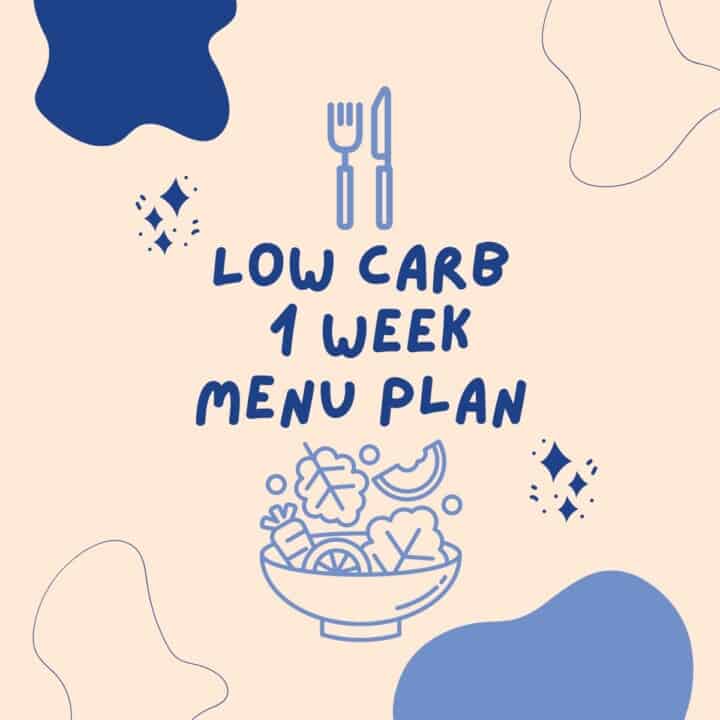Can diabetics eat bacon? It's a common question among people with diabetes who are looking for ways to manage their blood sugar levels while still enjoying the foods they love.
Bacon is a popular breakfast food and an ingredient in many dishes, but its high fat and salt content can make it a questionable choice for diabetics.
In this article, we'll explore whether or not diabetics can eat bacon and provide some tips for incorporating it into a healthy and balanced diet.

Jump To:
- Why are we asking this question?
- Other diabetes blog articles you might enjoy
- Type 2 diabetes and low carb diets
- Some low-carb recipes that use bacon
- Nutritional Value of bacon
- How does bacon affect blood sugar levels?
- What does the American Diabetes Association recommend?
- Eating bacon as part of a diabetic diet
- Healthy pairings and portion control
- Other considerations while eating bacon as a diabetic
- What can I eat instead of bacon?
- Frequently Asked Questions
- Final thoughts on eating bacon as a diabetic
For diabetics who follow a low-carb diet, bacon can be a good source of protein and fat. Since carbohydrates are the main nutrient that affects blood sugar levels, limiting carb intake can be an effective way for diabetics to manage their condition.
However, bacon is also high in saturated fats and sodium, which can increase the risk of heart disease and other health problems.
Why are we asking this question?
Can diabetics eat bacon? It's an important question to ask if diabetics can eat bacon because bacon is a high-fat, high-sodium food that can have a significant impact on blood sugar levels and overall health.
Since people with diabetes have difficulty regulating their blood sugar, it's important for them to carefully consider the foods they eat to avoid spikes or drops in glucose levels.
By understanding the impact of bacon on blood sugar and making informed choices about portion sizes and frequency of consumption, diabetics can still enjoy this popular food while managing their condition effectively.
Other diabetes blog articles you might enjoy
Type 2 diabetes and low carb diets
Type 2 diabetes is a condition in which the body becomes resistant to insulin, a hormone that regulates blood sugar levels. This can cause high blood sugar levels, which can lead to a range of health problems if not managed properly. One way to manage type 2 diabetes is through a low-carb diet.
A low-carb diet is a way of eating that limits the intake of carbohydrates, such as sugars and starches, and emphasizes protein and fat. By reducing carb intake, the body produces less insulin, which can help to regulate blood sugar levels.
This can be particularly beneficial for diabetics, as it can help to prevent spikes in blood sugar that can lead to complications.
Several studies have shown that low-carb diets can be effective for managing type 2 diabetes. In one study, a low-carb diet was found to be more effective than a low-fat diet at improving blood sugar control and reducing the need for medication.
Another study found that a low-carb diet was associated with significant improvements in blood sugar control and cardiovascular risk factors.
However, it's important for diabetics to work with a healthcare professional to determine the best dietary approach for their individual needs.
A low-carb diet may not be appropriate for everyone, and it's important to ensure that adequate nutrient intake is maintained while following a low-carb eating plan.

Take control of your type 2 diabetes and improve your health with our 1-week low carb menu plan! Designed to support blood sugar control. Start your journey towards better health today!
Nutritional Value of bacon
Bacon is a popular breakfast food that is known for its delicious flavor and crispy texture. While it's not typically thought of as a healthy food, bacon does provide some important nutritional benefits.
First and foremost, bacon is a good source of protein. Protein is an essential nutrient that is important for building and repairing tissues, supporting immune function, and promoting satiety.
A serving of bacon typically contains around 6-7 grams of protein, which can help to keep you feeling full and satisfied throughout the morning.
Bacon is also a source of various vitamins and minerals. For example, it contains small amounts of vitamin B1 (thiamin), vitamin B3 (niacin), and vitamin B12, which are important for energy production and healthy nervous system function.
Bacon also contains minerals like phosphorus, potassium, and zinc, which are important for bone health, muscle function, and immune support.
However, it's important to note that bacon is also high in fat and sodium, which can have negative health effects if consumed in excess.
A serving of bacon contains around 3-4 grams of saturated fat, which can contribute to high cholesterol levels and increase the risk of heart disease.
Additionally, bacon is often cured with salt, which can contribute to high blood pressure if consumed in large amounts.
Overall, if you are asking yourself "can diabetics eat bacon" it does provide some nutritional benefits, it's best consumed in moderation as part of a balanced diet that emphasizes whole, nutrient-dense foods.

How does bacon affect blood sugar levels?
Bacon is a high-fat food that contains very few carbohydrates. As a result, it typically has a minimal impact on blood sugar levels when consumed in moderation.
However, it's important to note that the way bacon is prepared can affect its impact on blood sugar. For example, if bacon is coated in a sweet glaze or served with a high-carbohydrate side dish, it can contribute to spikes in blood sugar levels.
Additionally, while bacon itself does not contain carbohydrates, it is often served with other high-carbohydrate foods like toast or pancakes. Consuming these foods in combination with bacon can contribute to higher blood sugar levels.
For people with diabetes, it's important to monitor blood sugar levels closely and make informed choices about the foods they eat.
While bacon can be enjoyed in moderation as part of a balanced diet, it's important to be mindful of portion sizes and to avoid consuming it in combination with other high-carbohydrate foods that can contribute to blood sugar spikes.
What does the American Diabetes Association recommend?
The American Diabetes Association (ADA) recommends that people with diabetes can eat bacon in moderation as part of a healthy and balanced diet.
However, it's important to be mindful of portion sizes and to avoid consuming it with high-carbohydrate foods like a hash browns combination breakfast, as this can cause blood glucose levels to spike.
While bacon itself is low in carbohydrates, it is often paired with high-carbohydrate foods like toast, pancakes, or hash browns, which can have a significant impact on blood glucose levels.
When consuming bacon, it's important to consider what other foods are being eaten alongside it and to choose low-carbohydrate options.
The ADA recommends that people with diabetes aim to consume a diet that is rich in whole, nutrient-dense foods like fruits, vegetables, lean protein, and healthy fats.
While bacon can certainly be enjoyed as part of this type of diet, it's important to consume it in moderation and to make informed choices about portion sizes and dietary pairings.
By making mindful choices and incorporating bacon into a healthy and balanced meal plan, people with diabetes can enjoy this tasty food while still managing their blood glucose levels effectively.

Eating bacon as part of a diabetic diet
As a high-fat food with little to no carbohydrates, bacon can be a good option for people with diabetes who are following a low-carb or ketogenic diet.
These types of diets have been shown to help regulate blood sugar levels and improve insulin sensitivity in people with diabetes.
However, it's important to be mindful of portion sizes and to choose high-quality, uncured bacon that is lower in sodium and free of added sugars.
Excessive consumption of bacon can lead to weight gain and may increase the risk of heart disease and other health problems.
Additionally, while bacon is low in carbohydrates, it's often served with other high-carbohydrate foods like toast or pancakes. Consuming these foods in combination with bacon can contribute to higher blood sugar levels.
Therefore, it's important for people with diabetes to be mindful of what they eat alongside the bacon.
Overall, bacon can be enjoyed as part of a healthy and balanced diabetic diet, but it's important to make informed choices and to consume it in moderation as part of a varied diet that includes plenty of nutrient-dense whole foods.
Healthy pairings and portion control
When it comes to enjoying bacon as part of a healthy and balanced diet, it's important to choose healthy pairings and control portion sizes. Here are a few tips to keep in mind:
- Pair bacon with nutrient-dense foods: Instead of pairing bacon with high-carbohydrate foods like toast or hash browns, try pairing it with nutrient-dense foods like eggs, avocados, or leafy greens. These foods provide a good source of protein, healthy fats, and fiber, which can help keep you feeling full and satisfied.
- Control portion sizes: While it can be tempting to indulge in a big stack of bacon, it's important to keep portion sizes in check. Aim for 1-2 slices of bacon per serving and consider using it as a flavor enhancer rather than the main focus of the meal.
- Use alternative cooking methods: While frying is a common way to cook bacon, it can also be high in fat and calories. Consider using alternative cooking methods like air frying, baking or grilling, which can help reduce the fat content and provide a delicious flavor.
- Consider healthier bacon alternatives: If you're looking for a healthier bacon alternative, consider turkey bacon or Canadian bacon. These options are typically lower in fat and calories than traditional bacon.
By following these tips, you can enjoy bacon as part of a healthy and balanced diet while also keeping your blood glucose levels under control.
Remember to make informed choices about portion sizes and dietary pairings, and to always consult with your healthcare provider about any dietary restrictions or recommendations.
Other considerations while eating bacon as a diabetic
If you have diabetes and asking yourself if diabetics can eat bacon and want to include bacon in your diet, there are a few additional considerations to keep in mind:
- Watch your portion sizes: It's important to be mindful of how much bacon you're consuming, as excessive consumption can lead to weight gain and other health problems. One or two slices of bacon is typically a reasonable serving size.
- Choose high-quality bacon: Look for high-quality, uncured bacon that is lower in sodium and free of added sugars. This can help to reduce your overall intake of salt and added sugars, which can have negative health effects if consumed in excess.
- Avoid pairing bacon with high-carbohydrate foods: While bacon itself is low in carbohydrates, it's often served with other high-carbohydrate foods like toast or pancakes. Consuming these foods in combination with bacon can contribute to higher blood sugar levels. Therefore, it's important to be mindful of what you eat alongside bacon.
- Consider other sources of protein: While bacon can be a delicious and satisfying addition to your diet, it's important to also include other sources of protein, such as lean meats, poultry, fish, eggs, and plant-based sources like beans and lentils. This can help to ensure that you're getting a variety of nutrients and can also help to keep you feeling full and satisfied.
Overall, while bacon can be enjoyed as part of a healthy and balanced diabetic diet, it's important to make informed choices and to consume it in moderation as part of a varied diet that includes plenty of nutrient-dense whole foods.

What can I eat instead of bacon?
If you're looking for alternatives to bacon, there are plenty of other delicious and nutritious options to choose from. Here are a few ideas:
- Ground beef: Regular ground beef can be a great source of protein and is a versatile ingredient that can be used in a variety of dishes. Just be sure to choose lean cuts and to cook it in a healthy way, such as grilling or broiling.
- Unprocessed meats: Instead of processed meats like bacon, you can opt for unprocessed meats like chicken, turkey, fish, or lean cuts of beef or pork. These options are lower in sodium and typically have less saturated fat than processed meats.
- Dairy: Dairy products like milk, cheese, and yogurt can be a good source of protein and calcium. Look for whole fat dairy or low-carb options to keep the saturated fat content in check.
- Whole grains: Whole grains like brown rice, quinoa, and whole wheat pasta can provide a healthy source of carbohydrates and fiber. Pair them with lean protein sources like chicken or fish for a balanced and satisfying meal.
By incorporating a variety of these foods into your diet, you can enjoy a range of flavors and textures while still maintaining a healthy and balanced diet including weight loss by following your meal plans.
Frequently Asked Questions
Yes, people with diabetes can eat bacon in moderation as part of a healthy and balanced diet.
People with diabetes should be mindful of portion sizes, choose high-quality bacon that is lower in sodium and free of added sugars, avoid pairing bacon with high-carbohydrate foods, and consider other sources of protein in their diet.
Yes, bacon can be a good option for people with diabetes who are following a low-carb or ketogenic diet, as it is high in fat and low in carbohydrates. However, it's still important to consume it in moderation and be mindful of other dietary considerations.
Final thoughts on eating bacon as a diabetic
In conclusion, diabetics can certainly enjoy bacon as part of a healthy and balanced diet. Bacon is a good source of protein and is low in carbohydrates, making it a good option for those following a low-carb or ketogenic diet.
However, it's important to consume bacon in moderation, be mindful of portion sizes, choose high-quality bacon that is lower in sodium and free of added sugars, and consider other sources of protein in your diet.
By making informed choices and incorporating bacon into a balanced meal plan, people with diabetes can enjoy this tasty treat as part of a varied and nutritious diet.










Leave a Reply